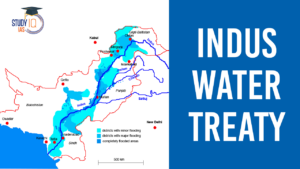Table of Contents
Global Cooling Watch 2023
Context: The Cool Coalition, led by the United Nations Environment Programme (UNEP), has published a report titled “Keeping it Chill: How to meet cooling demands while cutting emissions”
Global Cooling Pledge
- The Global Cooling Pledge, initiated during the COP28 climate summit, aims to cut cooling emissions by at least 68% by 2050, proposing various approaches to achieve this target.
- It has been endorsed by 63 nations, including the United States, Canada, and Kenya, although India has not yet joined the initiative.
We’re now on WhatsApp. Click to Join
Key Highlights Of The Report
- Passive cooling strategies can significantly decrease cooling requirements in buildings and cold storage, potentially reducing 2050 cooling capacity demand by 24%.
- This could lead to savings of $1.5 to $3 trillion in new cooling equipment costs and cut CO2 emissions by 1.3 billion tons in 2050.
- Implementing higher energy efficiency standards for cooling devices is crucial.
- To achieve significant reductions, the global efficiency average of all cooling equipment by 2050 needs to be nearly three times higher than today’s levels(20% of total electricity consumption).
- Enhancing efficiency in the cold chain and refrigeration, using minimum energy performance standards (MEPS) and passive cooling, could account for 30% of the necessary energy savings by 2050 and significantly diminish food loss and waste.
- Accelerating the reduction of hydrofluorocarbon (HFC) refrigerants beyond the Kigali Amendment’s requirements, while also boosting cooling equipment’s energy efficiency, could slash cooling-related emissions by over 60% by 2050.
- Combining these measures with a rapid transition to a decarbonized electricity grid could increase emission reductions from cooling to 96% by 2050.
| Kigali Amendment |
| In 2016, over 150 countries (including India) signed to the Montreal Protocol, agreeing to reduce HFC consumption by 80% by 2047. |
India’s Cooling Action Plan(ICAP)
- In 2019, the Indian government’s Ministry for Environment, Forest & Climate Change introduced the India Cooling Action Plan (ICAP).
- ICAP aims to ensure sustainable cooling and thermal comfort for everyone, focusing on achieving both environmental and socio-economic benefits for the community.
- Targets:
- Reducing cooling demand across sectors by 20-25% by 2037-38
- Reduce refrigerant demand by 25-30%by 2037-38
- Reduce cooling energy requirements by 25-40% by 2037-38
- Recognize “cooling & related areas” as a thrust areas of research under national S&T program
- Training & certification of 100,000 servicing sector technicians by 2022-23, synergizing with Skill India Mission.
27th WAIPA World Investment Conference
Context: India is set to host the 27th World Investment Conference (WIC) from December 11-14, 2023, in New Delhi.
About World Investment Conference (WIC)
- World Investment Conference (WIC): Annual flagship event of the World Association of Investment Promotion Agencies (WAIPA).
- Function: A global platform for investment promotion and innovation stakeholders.
- 2023 Theme: “Empowering Investors: IPAs Pioneering Future Growth.”
- Organiser: Invest India, the current WAIPA President and India’s national agency for investment promotion under the Ministry of Commerce and Industry.
- Role of Invest India: Facilitates investors under the ‘Make in India’ initiative for business establishment and expansion in India.
- 2023 WIC Highlights:
- First-ever in India, set to be the largest.
- Unites various stakeholders to discuss investment policies and trends, offering networking and partnership opportunities.
- Features the Experience India Centre (EIC) to exhibit India’s premier services, technology, and products using digital technologies like virtual and augmented reality.
World Association of Investment Promotion Agencies (WAIPA)
- World Association of Investment Promotion Agencies (WAIPA): A non-governmental forum for investment promotion agencies (IPAs).
- Establishment: Founded in 1995 by the United Nations Conference on Trade and Development.
- Secretariat Location: Istanbul.
- Membership: Over 120 member agencies from more than 100 countries.
- Primary Objectives:
- Enhance understanding and cooperation among IPAs.
- Support IPAs in advising governments on investment promotion strategies and policies.
- Serve as a mediator between public and private sectors.
Financial Stability Board (FSB) Report On Crypto Asset Intermediaries
Context: Following FTX’s implosion, FSB urges stricter rules for crypto firms juggling trading, lending, and custody.
About Financial Stability Board (FSB)
- The Financial Stability Board (FSB) is the global watchdog for financial stability.
- Established in: 2009, succeeded the Financial Stability Forum
- Members: 68 member institutions, including central banks, finance ministries, and regulatory authorities from 25 countries.
- Mandate: To strengthen financial systems and ensure the stability of international financial markets. It achieves this by:
- Coordinating global financial policy: Bringing together diverse perspectives from major economies to forge common ground on crucial issues.
- Developing and promoting best practices: Setting global standards and guidelines for financial regulation and supervision.
- Identifying and mitigating risks: Monitoring emerging threats to financial stability and proposing solutions to address them.
- From G20 to Global: With its headquarters in Basel, Switzerland, the FSB’s reach extends far beyond its initial G20 origins.
India’s Role
India plays an active role in the FSB, holding three seats in its plenary:
- Secretary (Department of Economic Affairs)
- Deputy Governor of the Reserve Bank of India (RBI)
- Chairman of the Securities and Exchange Board of India (SEBI)
| FTX Collapse |
FTX as an MCI
Transparency Issues
Potential Consequences
|
Urban Flood Mitigation Project
Context: PM approved the first urban flood mitigation project for the ‘Integrated Urban Flood Management Activities (IUFM)’ for the Chennai Basin Project under the National Disaster Mitigation Fund (NDMF).
About The Project
- The project is India’s inaugural effort to address urban flooding following the severe floods in Chennai.
- It will receive financial support from the Asian Development Bank.
- Highlights: It includes enhancing Chennai’s ability to withstand natural disasters by implementing effective flood management strategies and taking proactive measures to address urban flooding challenges.
About National Disaster Management Fund (NMDF)
- Established under Section 47(1) of the Disaster Management Act, 2005.
- Exclusively allocated for mitigation projects related to disasters specified in National Disaster Response Fund (NDMF) guidelines.
- The Mitigation Fund supports local and community initiatives to reduce risks and promote sustainable settlements and livelihoods.
- Major mitigation projects such as coastal walls and flood embankments are funded through standard development schemes, not the mitigation fund.


 UDAN Scheme, Objectives, Funding and Ach...
UDAN Scheme, Objectives, Funding and Ach...
 Indus Water Treaty 1960 Suspended by Ind...
Indus Water Treaty 1960 Suspended by Ind...
 5 Years of SVAMITVA Scheme and Its Benef...
5 Years of SVAMITVA Scheme and Its Benef...





















